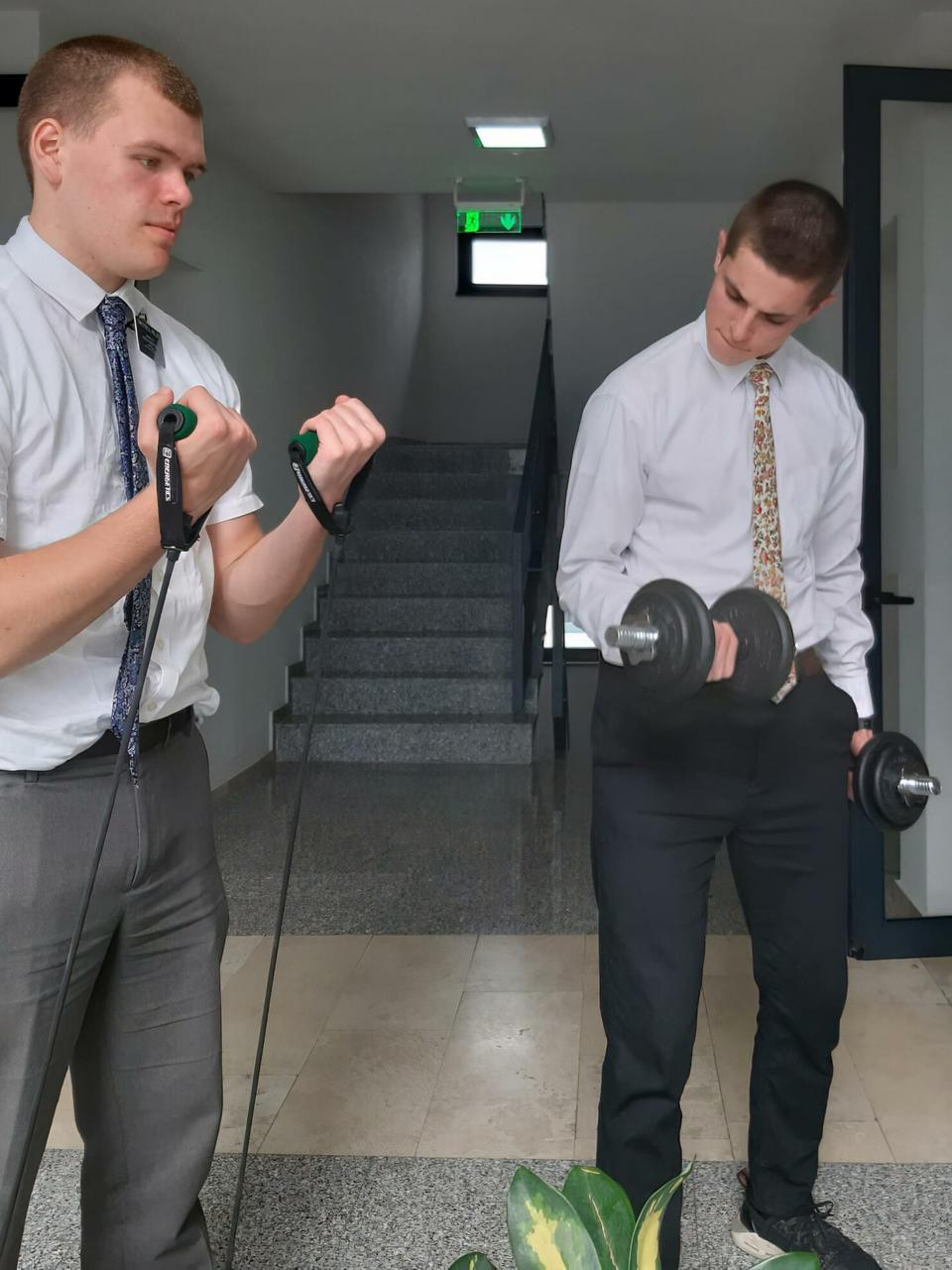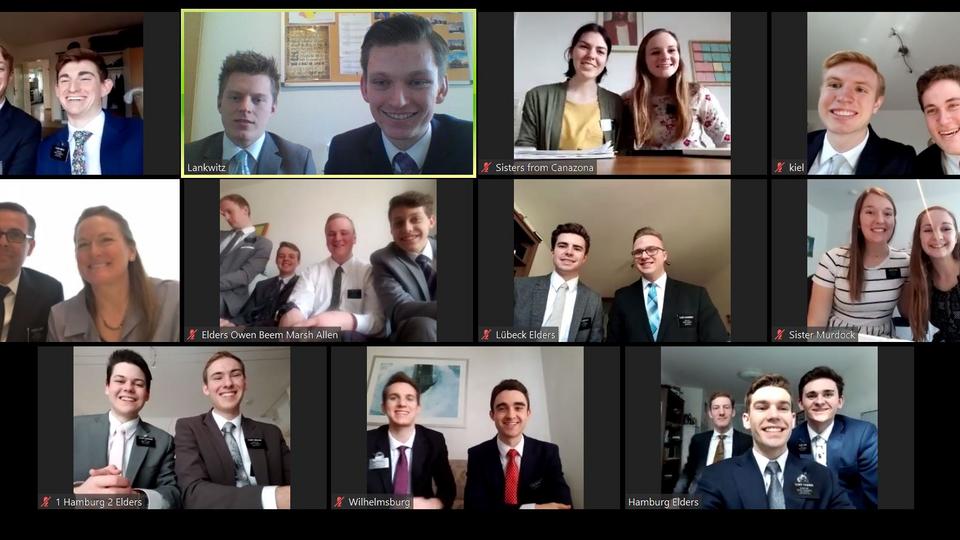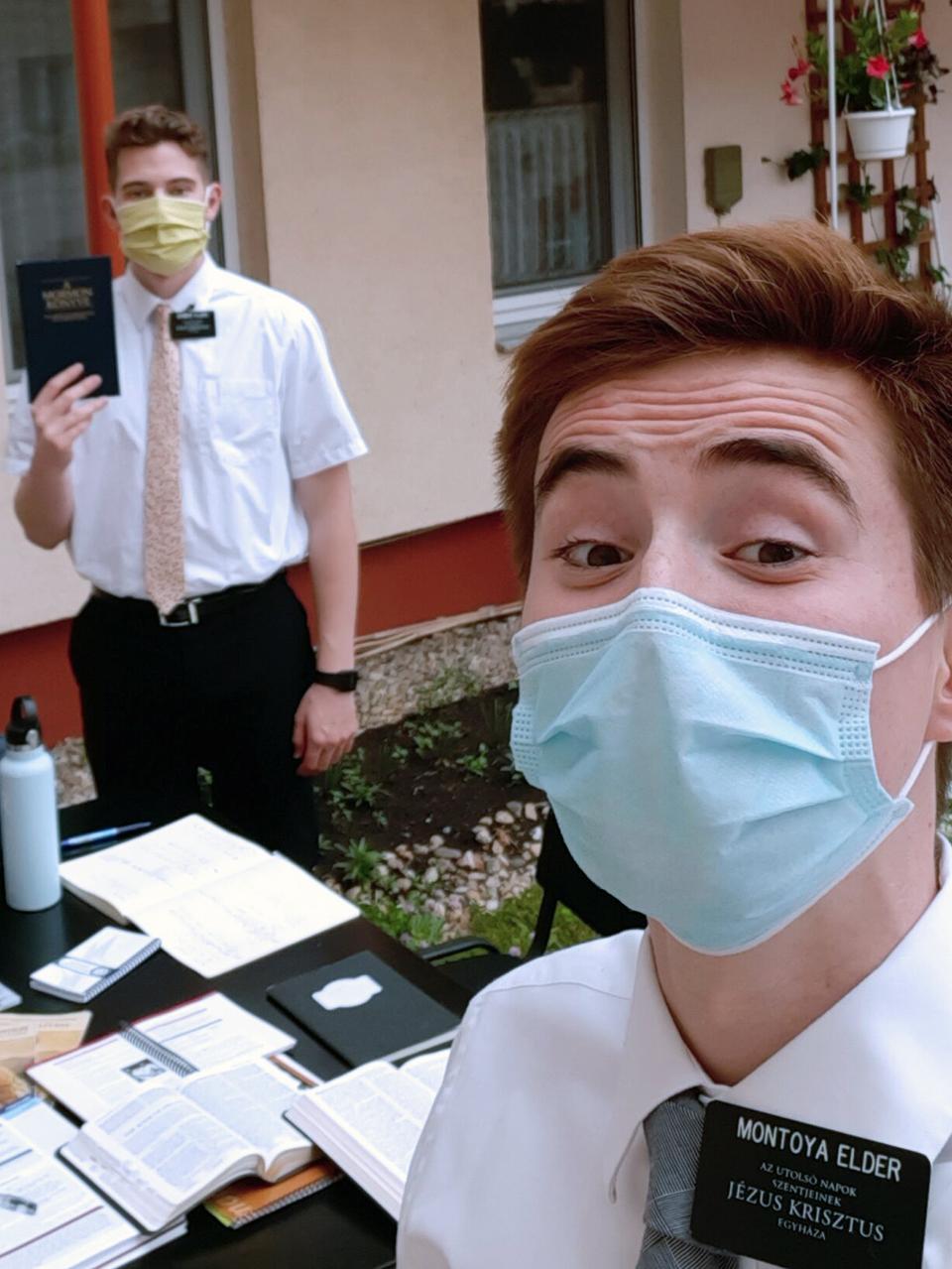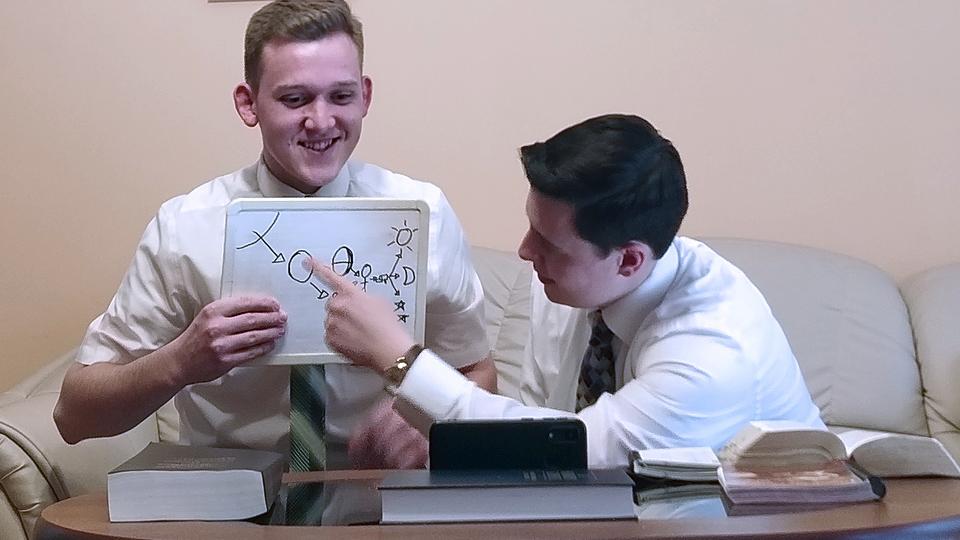- Missionary Work in Europe during COVID-19
- Missionary work in Europe during COVID-19
- Missionary work in Europe during COVID-19
- Missionary work in Europe during COVID-19
- Missionary work in Europe during COVID-19
- Missionary work in Europe during COVID-19
- Missionary Work in Europe during COVID-19
- Missionary work in Europe during COVID-19
- Missionary work in Europe during COVID-19
- Missionary work in Europe during COVID-19
- Missionary work in Europe during COVID-19
- Missionary work in Europe during COVID-19
- Missionary work in Europe during COVID-19
- Missionary Work in Europe during COVID-19
- Missionary Work in Europe during COVID-19
| Temple Square is always beautiful in the springtime. Gardeners work to prepare the ground for General Conference. © 2012 Intellectual Reserve, Inc. All rights reserved. | 1 / 2 |
This story appears here courtesy of TheChurchNews.com. It is not for use by other media.
By Scott Taylor, Church News
President Bart D. Browning and Sister Gail Browning of the Italy Milan Mission were returning from a stake conference in Venice the last weekend of February when the COVID-19 pandemic broke out in northern Italy.
The Brownings educated themselves on the virus, sent detailed instructions and precautions to missionaries, and then started to transfer and consolidate missionaries in a race against the closures of entire cities and borders.
Just weeks before Italy completely shut down and went into a full government-mandated quarantine, the elders and sisters of the Milan mission were put in social isolation. No travel on public transportation, the main mode of getting around. No in-person visits to members or those learning of the gospel. No use of local meetinghouses for lessons or English Connect classes or any meeting or activity.
“As we strived each day to have faith in the request by the Brethren that we stay and shelter in place, we felt the hand of the Lord going forward,” President Browning said. “We felt total peace in supporting them in this decision — and then went forward in faith.
“It is interesting that it took a pandemic to teach us so much,” he continued. “It is always so insightful to look back and see growth. Our mission motto became ‘Survive, strive and thrive.’”
The three words aptly describe missionaries, mission leaders and missionary work throughout the Church’s Europe and Europe East areas. While nearly all of the other missions worldwide were having missionaries return to their home countries as part of the Church’s pandemic adjustments, most missionaries have remained as previously assigned within the missions in the Europe and Europe East areas, the exceptions being the return and release of senior missionaries and younger missionaries who were considered at risk with pre-existing health conditions.
Despite being in isolation for months now, missionaries in Europe are not simply waiting out the pandemic. Rather, they are using technology — from smartphones to social-media platforms — to not only sustain the gathering of scattered Israel through missionary work but to increase finding and teaching efforts.
Along with President and Sister Browning, President Kyle B. Hettinger of the Hungary/Romania Mission and President Axel H. Leimer of the Germany Berlin Mission recently recounted to the Church News some of the pandemic-period challenges, opportunities and successes in their respective missions, representative of their counterparts throughout the continent during COVID-19.
Missionaries from the Hungary/Romania, Berlin and Milan missions also shared their perspectives and experiences of serving during the pandemic.

Missionary Work in Europe during COVID-19
Elders Evan Nielsen and John Beck of the Hungary/Romania Mission take a break from their daily schedule to exercise in their apartment in Cluj-Napoca, Romania, in May 2020. Photo courtesy of Sister Barbara Hettinger, courtesy of Church News.2020Ensuring Health and Well-Being
With missionaries in isolation, the Hungary/Romania Mission revised its daily schedule to include an hour of outdoor walking, running or exercise at both 6:35 a.m. and 8:15 p.m. “This has been a huge hit and has done wonders for our mental health,” said President Hettinger, adding that districts share brief video clips of such efforts for encouragement and accountability.
The missionaries’ schedule of intense online proselyting and member activities has been interspersed with frequent stretching, yoga and relaxation/mindfulness moments. Districts hold 15-minute online meetings daily to set and review goals, President Hettinger added, while each zone provides a three-minute morning podcast to remind of zone goals and to build unity.
The Italy Milan Mission quickly compiled a list of some 40-plus creative ideas of what missionaries could do while staying close to their apartments — journaling, writing letters and thank-you notes, composing talks, preparing and practice-teaching lessons, deep-cleaning the apartment, doing extra language studies, calling and checking in with members, increasing personal Book of Mormon study, pre-marking copies of the Book of Mormon for distribution, reading, cooking, painting and going for a walk or jog.
The Germany Berlin Mission created a “COVID-19 calendar” to break up the days and provide ways to connect missionaries with each other and their mission leaders.
Calendar elements include daily missionwide morning devotionals, tips from a “technology task force” on proselyting from the apartment, a half-hour “kindness is the cure” effort ranging from making calls or notes to baking cookies, additional time to specifically study the Restoration, a fixed time for companionships to review technology safeguards and do device audits, and sharing examples or short how-to videos on personal skills ranging from painting or cooking to sewing and even cutting hair.
The calendar also includes weekly cleaning challenges, “Friday night reruns” with old Church movies uploaded for missionwide viewing, and twice-a-week afternoon “story time” sessions, with Sister Leimer reading children’s books by the likes of Dr. Seuss and Max Lucado. “Missionaries got their blankets and were glued to the screen,” President Leimer said.

Missionary Work in Europe during COVID-19
President Alex H. Leimer and Sister Trisha Leimer, in the far left of the second row of screens, join missionaries online for the Hamburg Zone conference in May 2020. 2020Lessening Anxieties
Anxiety was admittedly high, Sister Browning said. “No one had ever worked through a coronavirus pandemic before, and we didn’t get any training on this when we went to the MTC.”
The Milan mission has maintained daily contact with its missionaries, including nightly Facebook Live devotionals and regular video-conference calls, the latter becoming the norm for all district and zone meetings, interviews, zone conference and leadership council meetings via Zoom or WhatsApp video.
And with northern Italy being one of the global epicenters of the virus, the Milan mission helped reassure parents and families of missionaries with daily updates in early morning emails.
Missionwide interactions with elders and sisters included Sunday night firesides, which were extended to include the Italy Rome mission, with a focus on messages, skills, encouragements and prayer. Preparation days have included cooking classes with an Italian counselor in the mission presidency, online virtual tours of places to visit in Italy, approved movies and language classes with native Italians.
Missionaries in the Berlin mission have been allowed, per Churchwide adjustments during the pandemic, to call home twice a week — once on preparation day and once on day of their choosing, President Leimer said. The mission also provided frequent updates to the missionaries’ parents and home stake presidents.
The Hungary/Romania Mission sent out a half-dozen communications to parents in the pandemic’s early days to apprise them of developments and efforts to assure the health and safety of their missionaries, said President Hettinger, adding that only a handful of missionaries felt a need to reach out to anxious parents at times other than on their preparation days.

Missionary work in Europe during COVID-19
Elders Elijah Montoya, foreground, and Harrison Bement of the Hungary/Romania Mission mask up to study on the patio of their Szolnok, Hungary, apartment in May 2020. Photo courtesy of Sister Barbara Hettinger, courtesy of Church News.nullNewfound Missionary Techniques
Like their counterparts across Europe, missionaries in the Berlin, Milan and Hungary/Romania missions have honed both existing and newfound missionary skills and techniques, such as methodical area book work; re-established and re-nurtured relationships; focused online finding and teaching; online “English Connect” classes; telephone calls, video calls and social-media interactions; time previously spent traveling to appointments now better spent through technological communications; shared musical talents; and more.
President Hettinger noted that missionaries in the Hungary/Romania mission are teaching more than twice as many lessons now than before the pandemic and inviting many more to baptism as well.
“We recently had missionaries create a video short in each country showing missionaries passing around a Book of Mormon and telling about being missionaries and how the Book of Mormon can help them,” he added. “We have so far had over 36,000 views between both videos.”
With more than 30 individuals committed for baptism as soon as the quarantine ends, missionaries in the Milan mission are finding success with video calls to work with members, returning members and friends learning of the gospel. With the latter two groups, video calls “have allowed us to have daily contact with them that strengthens their testimonies of Christ and the truthfulness of His Church,” Sister Browning said.
Similar video calls with members are providing access into homes that missionaries had previously not been able to enter, she added. “Everyone has time to do a 20-minute phone call, and there is no need to feed the missionaries.”
In addition to work within the Berlin mission, President Leimer said missionaries also have found success in reaching out to friends and family back home — helping family members to pray or study the gospel or attend Church meetings more regularly, sharing weekly lessons with a nonmember parents, teaching the gospel to grandparents or sharing simple testimonies with less-active siblings.
“All these opportunities to share the gospel have come about in a most natural way,” he said. “After all, what is more natural then to share the gospel with those we are closest to?”

Missionary work in Europe during COVID-19
Elders Cole Brooks, left, and Hunter Strobel of the Hungary/Romania Mission use a visual aid in teaching via a smartphone in May 2020 from their Nyiregyhaza, Hungary, apartment. Photo courtesy of Sister Barbara Hettinger, courtesy of Church News.nullFinal Thoughts
Most importantly, Hungary/Romania missionaries — like those throughout the Europe and Europe East areas — have been mindful that their missionary purpose remains the same during isolation, President Hettinger said.
“We would just find new ways to fulfill that purpose and stay on the Lord’s errand. Truly, our missionaries have done an extraordinary job of striving to gather scattered Israel in the pandemic.”
Added President Browning of the Milan mission: “Patience, hope, faith and diligence are some of the Christlike attributes we have all learned better. We are teaching more people more often, and at the same time ministering to our members. As a result, our member relations are stronger than ever before and our “finding” now comes primarily from ministering and teaching.”
Sometimes individuals find themselves forced to learn new things never before considered, as was the case with President Leimer of the Berlin mission.
“At first we wondered how we could maintain a real proselyting effort — how could we teach our missionaries things we did not know ourselves?” he said. “Then we again discovered the resilience and dedication of our missionaries and their creativity. The Lord guided them and provided the opportunity in which they could apply their talents. …
“With all of our meetinghouses and temples closed, half the missionaries on their way home and the remaining missionaries bound to their apartments, one could easily think, ‘This is it.’ But it is still the Lord’s Church and His work.”
Like other missions, the number of lessons taught in the Berlin mission started going up significantly after the first couple of weeks of isolation and restrictions, well beyond what missionaries had been teaching before the pandemic broke out, President Leimer said.
“The work continues — differently, but better.”
Copyright 2020 Deseret News Publishing Company
